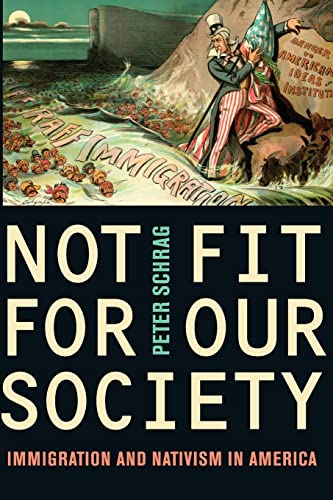All books / Book
Not Fit for Our Society

| Full title: | Not Fit for Our Society |
|---|---|
| ISBN: | 9780520269910 |
| ISBN 10: | 0520269918 |
| Authors: | Schrag, Peter |
| Publisher: | University Of California Press |
| Edition: | First |
| Num. pages: | 320 |
| Binding: | Paperback |
| Language: | en |
| Published on: | 2011 |
Read the reviews and/or buy it on Amazon.com
Synopsis
"Peter Schrag is the model for all political writers. He is committed, passionate and eloquent, but always stays harnessed to the facts and rooted in the realities of politics and human nature. He reports out everything, and he writes like a dream. We can be grateful that in Not Fit for Our Society he has turned his gifts to the seemingly intractable problem of immigration. We will have to settle this issue again, as we always manage to do despite enormous commotion and anxiety. Schrag will force everyone to think more clearly and to approach immigration with both compassion and good sense."—EJ Dionne, Jr., author of Souled Out
"Just who is fit to be part of the society that became a nation in 1776 and who decides, and on what basis?
In Not Fit for Our Society, Peter Schrag offers an invigorating, well-informed, carefully reasoned investigation into today's immigration debates."—David Hollinger, President of the Organization of American Historians, 2010-2011
"Peter Schrag has a unique view of the immigration debate and policies that have shaped our country since it's founding. His very timely writing of Not Fit for our Society helps us to better understand how the immigration debate and politics have gotten us to where we are today. His insights and intellect on the subject give all of us much to think about as we move forward on this very important issue."—Doris O. Matsui, Member of Congress
"Peter Schrag has done it again. A sweeping review that puts the ferocity of our current immigration debate in historical context, Not Fit for Our Society is a must-read for those hoping to get past talk-show rhetoric and cherry-picked facts. Uncovering the dark impulses that have long undergirded nativist thought, he argues that we have seen this before—and that America will be better if we see through it again."—Manuel Pastor, University of Southern California
"Peter Schrag offers a lively and thoughtful reinterpretation of America's ambivalence about immigration and immigrants' place in the nation's life. Drawing on his reading of primary sources and the latest scholarship, he tells a story rich in irony, detail, and nuance, tracing the history of nativism from the earliest days of the Republic to the current debates over immigration reform. The book is particularly striking for the way that it connects the arguments and organizations of the current anti-immigration movement to their roots in the eugenics movement and pseudo-scientific racism of the early 20th century."—Mark Paul, New America Foundation
"History's lessons come through loud and clear as Peter Schrag vividly recounts the characters and the ideas behind that side of America that rejects immigration. Illuminating both in its sweep and its detail this 300-year narrative makes an important contribution to our understanding of today's policy debates."—Roberto Suro, author of Strangers Among US: Latino Lives in a Changing America
"
In an intemperate time, Peter Schrag's voice is lucid and truly American."—Richard Rodriguez
Publishers Weekly
Schrag (Paradise Lost) offers a scholarly history of the political movements that have sought to restrict immigration to the U.S. since its founding—from the 19th-century Know-Nothing Party through the years of American eugenics “research” that vastly influenced the Nazis in the years leading up to WWII. He points out how the same anti-immigration and anti-immigrant arguments have been recycled across generations: most notably the idea that certain groups—be they the Irish, Jews, Chinese, or Mexicans—were “inassimilable.” Though he doesn't provide any especially new insights, Schrag has assembled a fine history of nativist movements and the reasons why their rhetoric has been so seductive at particular points in history. The book would have been well-served had Schrag devoted more time to untangling the provocative idea he concludes with: that rather than “becoming white” and thus acceptable—the path trod by previous generations of European and Jewish immigrants—today's Latino and Asian immigrants may be shifting the paradigm and derailing the very mechanism that keeps the U.S. on a locked pattern of exclusion and race-based fearmongering against new immigrants. (May)